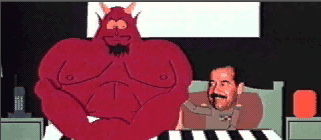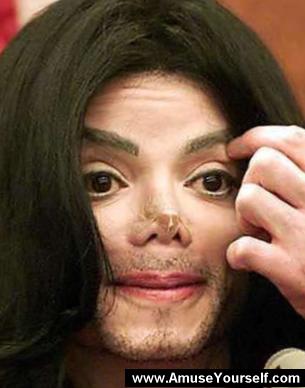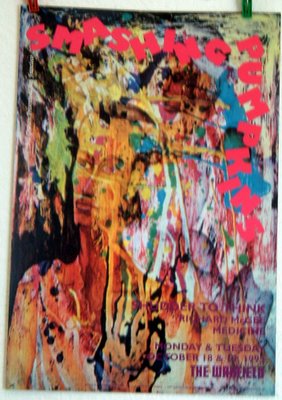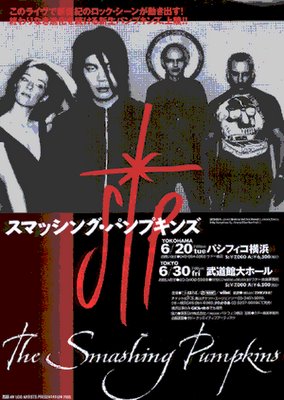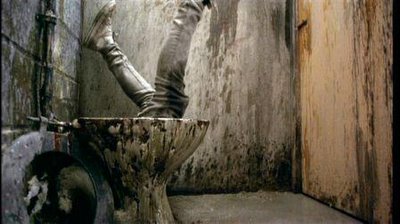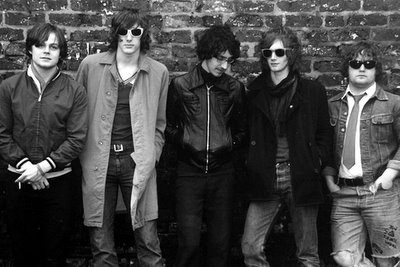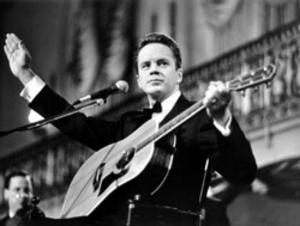 http://en.wikipedia.org/wiki/Johnny_Cash
http://en.wikipedia.org/wiki/Johnny_CashJohn Ray Cash (February 26, 1932 – September 12, 2003) was a vastly influential American country music singer, guitarist, and songwriter.
Cash was known for his distinctive voice, the boom chicka boom sound of his Tennessee Two backing band, and his dark clothing and demeanor, which earned him the nickname "The Man in Black". He always started his concerts with the simple introduction, "Hello, I'm Johnny Cash."
Fueled by his own rocky personal life and spiritual path, much of Cash's music, especially that of his later career, echoed themes of sorrow, moral tribulation and redemption. Hits include "I Walk the Line", "Folsom Prison Blues", "Ring of Fire", "Man in Black" and "Hurt". However, he also recorded several humorous songs, such as "One Piece At A Time", "The One on the Right is on the Left" and "A Boy Named Sue".
In a career that spanned almost five decades, Cash was the personification of country music to many people around the world, despite his distaste for the Nashville mainstream. Yet, like Bob Dylan and Elvis Presley, Cash is a figure who transcends genre. He has recorded songs that could be considered rock and roll, blues, rockabilly, folk and gospel, and has exerted an influence on each of those genres. Cash is one of ten performers to be inducted into both the Rock and Roll Hall of Fame and the Country Music Hall of Fame alongside Jimmie Rodgers, Hank Williams Sr., Bill Monroe, Bob Wills, Elvis Presley, The Everly Brothers, Brenda Lee, Chet Atkins and Floyd Cramer, as well as Cash's first producer and discoverer, Sam Phillips of Sun Records. His pioneering contribution to the genre has been recognized by the Rockabilly Hall of Fame.
Early lifeBy age five Cash was working in the cotton fields, singing along with his family as they worked. The family farm was flooded on at least one occasion, which later inspired him to write the song "Five Feet High And Rising." Cash was very close to his brother Jack. In 1944, an accident occurred that affected Johnny Cash for the rest of his life; Jack was pulled into a whirring table saw in the mill where he worked, and almost cut in two. He suffered for over a week before he died. Cash always talked of the horrible guilt he felt over this incident because he had gone out fishing that day. On his deathbed, Jack said he had visions of heaven and angels before he died. Almost sixty years later, Johnny still talked of looking forward to meeting his brother in Heaven. His early memories were dominated by gospel music and radio. He began playing guitar and writing songs as a young boy, and in high school sang on a local radio station. He was dubbed "John" upon enlisting as a radio operator in the Air Force, which refused to accept initials as his name. Thereafter, he was known as Johnny and sometimes as John R. While an airman in West Germany, Cash wrote one of his most famous songs, "Folsom Prison Blues" after seeing the B-Movie Inside the Walls of Folsom Prison.
Early careerAfter his term of service ended, Cash married Vivian Liberto in 1954 and moved to Memphis, Tennessee, where he sold appliances while studying to be a radio announcer. At night, he played with guitarist Luther Perkins and bassist Marshall Grant (the Tennessee Two). Cash worked up the courage to visit the Sun Records studio, hoping to garner a recording contract. Sun producer Cowboy Jack Clement met with the young singer first, and suggested that Cash return to meet producer Sam Phillips. After auditioning for Phillips, singing mainly gospel tunes, Phillips told him to "go home and sin, then come back with a song I can sell". Cash eventually won over Phillips and Clement with new songs delivered in his early frenetic style. His first recordings at Sun, "Hey Porter" and "Cry Cry Cry", were released in 1955 and were met with reasonable success on the country hit parade.
Cash's next record, Folsom Prison Blues, made the country Top 5, and "I Walk the Line" was number one on the country charts, making it into the pop charts Top 20. In 1957, Johnny Cash became the first Sun artist to release a long-playing album. Though Sun's most consistently best-selling and prolific artist at that time, Cash began to feel constrained by his contract with the small label. Elvis Presley had already left the label, and Phillips was focusing most of his attention and promotion on Jerry Lee Lewis. The following year, Cash left Sun to sign a lucrative offer with Columbia Records, where his single "Don't Take Your Guns to Town" would become one of his biggest hits.
In 1955, his daughter, singer Rosanne Cash, was born. Though he would have three more daughters (Kathy, Cindy, and Tara) with his wife, their relationship began to sour, as Johnny was constantly touring. It was during one of these tours that he met June Carter, whom he married in 1968. By June's account, in the liner notes to the compilation album Love (2000), the song "I Still Miss Someone" was written about her.
Drug AddictionAs his career was taking off in the early 1960s, Johnny Cash became addicted to amphetamines and barbiturates. Friends joked about his "nervousness" and erratic behavior, many ignoring the signs of his worsening drug addiction. For a brief time, Cash shared an apartment in Nashville with Waylon Jennings, who was also heavily addicted to amphetamines. Though in many ways spiraling out of control, his frenetic creativity was still delivering hits. His song "Ring of Fire" was a major crossover hit, reaching number one on the country charts and entering the Top 20 on the pop charts. The song was co-written by June Carter and Merle Kilgore and originally performed by Carter's sister, but the signature mariachi-style horn arrangement was conceived by Cash, who claimed to have heard it in a dream. The song, written about Cash, describes the personal hell Carter went through as she wrestled with her forbidden love for Cash (they were both married to other people at the time) and as she dealt with Cash's personal "ring of fire" (drug dependency and alcohol abuse)
Although he carefully cultivated a romantic outlaw image, many fans are surprised to learn that he never served a prison sentence, though his wild activities and misdemeanors landed him in jail seven times, all for one night. His most serious run-in with the law occurred while on tour in 1965, when he was arrested by the narcotics squad in El Paso, Texas. Though the officers suspected that he was smuggling heroin from Mexico, he was actually smuggling illegal amphetamines inside his guitar case. He only received a suspended sentence. He was also arrested the next year in Starkville, Mississippi for trespassing late at night onto private property to pick flowers. More notably, he voluntarily entered several prisons to perform a series of concerts for convicts, for whom he felt a great compassion.
The mid 1960s saw Cash release a number of concept records, including Ballads Of The True West (1965) — an experimental double record mixing authentic frontier songs with Cash's spoken narration, let down by the modern arrangements — and Bitter Tears (1964), with songs highlighting the plight of the American Indians. However, his drug addiction deepened, and his destructive behaviour led to a divorce and numerous problems performing.
For his album Bitter Tears, Cash recorded "The Ballad of Ira Hayes", a Peter LaFarge song that told the true story of a Pima Indian who was one of the Marine heroes of the epic WWII battle at Iwo Jima. Despite his heroism, Hayes returned home to crushing despair and racial prejudice: "Ira Hayes returned a hero, celebrated throughout the land / He was wined and speeched and honored, everybody shook his hand / But He was just a Pima Indian, no water, no home, no chance / At home nobody cared what Ira had done, and when do the Indians dance?" Though "The Ballad of Ira Hayes" was a No. 3 country single, many stations refused to play it, deeming it too risky. Cash took out a full-page ad in Billboard denouncing country radio for its reluctance. "'Ballad of Ira Hayes' is strong medicine," he wrote. "So is Rochester, Harlem, Birmingham, [referring to then-recent race riots] and Vietnam."
Personal problems and calamity followed him to his new home on Old Hickory Lake in Hendersonville, Tennessee (outside of Nashville). His longtime guitarist, Luther Perkins, died in a house fire in August 1968. Less than two months later, the home of his next door neighbor and close friend, Roy Orbison, burned down, claiming the lives of two of Orbison's three young sons. Cash was profoundly affected by these incidents, and he attempted to take the first steps on the long, hard road to recovery. He locked himself in his home and underwent detox, relying heavily on his friends and June Carter and her parents Ezra and Maybelle (members of the Carter Family). He would soon marry June Carter. The love ballad "Flesh and Blood" is one of the first of many songs Cash would write about his lifelong love for his wife.
Over the next two years, he recorded and released two massively successful live albums, Johnny Cash at Folsom Prison (1968) and Johnny Cash at San Quentin (1969). The Folsom Prison record was charged by a blistering rendition of his classic "Folsom Prison Blues", while the San Quentin record included the crossover hit single "A Boy Named Sue", a Shel Silverstein-penned song that reached number one on the country charts and number two on the US Top Ten pop charts. Shortly after his historic concert at Madison Square Garden in the last days of the 1960s, his son John Carter Cash was born.
After he quit drugs in the 1960s and early 1970s, he rediscovered his Christian faith, taking an "altar call" in Evangel Temple, a small church in the Nashville area.
"The Man in Black"From 1969 to 1971, he starred in his own television show on the ABC network. The singing group The Statler Brothers got their start on Johnny's show, opening up for him in every episode. Notable rock artists appeared on his show, including Neil Young, The Monkees and Bob Dylan. Cash had been an early supporter of Dylan even before they had met, but they became friends while they were neighbors in late 1960s in Woodstock, New York. Cash was enthusiastic about reintroducing the reclusive Dylan to his audience. In addition to the appearance on his TV show, Cash sang a duet with Dylan on his country album Nashville Skyline, and also wrote the album's Grammy-winning liner notes. Another artist who received a major career boost from The Johnny Cash Show was songwriter Kris Kristofferson. During a live performance of Kristofferson's "Sunday Morning Coming Down", Cash made headlines when he refused to change the lyrics to suit network executives, singing the song with its controversial references to marijuana intact: "On the Sunday morning sidewalks / Wishin', Lord, that I was stoned".
Immensely popular, and an imposing tall figure, by the early 1970s he had crystallized his public image. He regularly performed dressed all in black, wearing a long black knee-length coat, causing him to be dubbed "The Man in Black". This outfit stood in stark contrast to the costumes worn by most of the major country acts in his day – rhinestone Nudie suits and cowboy boots. In 1971, Johnny wrote the song "Man in Black" to help explain his dress code: "I wear the black for the poor and the beaten down, / Livin' in the hopeless, hungry side of town, / I wear it for the prisoner who has long paid for his crime, / But is there because he's a victim of the times."
In the mid-'70s, Cash's popularity and hit songs began to decline, but his autobiography, titled Man in Black, was published in 1975 and sold 1.3 million copies. (A second, Cash: The Autobiography, appeared in 1998). His friendship with Billy Graham led to the production of a movie about the life of Jesus, The Gospel Road, which Cash co-wrote and narrated. The decade saw his religious conviction deepening, and in addition to his regular touring schedule, he made many public appearances in an evangelical capacity. He also continued to appear on television, hosting an annual Christmas special on CBS throughout the 1970s. Later television appearances included a role in an episode of Columbo, as well as a recurring role on Dr. Quinn, Medicine Woman. He did a voice cameo on The Simpsons in the show's eighth season, playing the voice of a coyote that guides Homer on a spiritual quest [in episode 3F24]. He also appeared with his wife, June Carter, on an episode of Little House on the Prairie entitled "The Collection" and gave a stirring performance as John Brown in the 1980's Civil War television mini-series "North and South".
HighwaymenIn 1980, Cash became the Country Music Hall of Fame's youngest living inductee at age 48, but during the 1980s his records failed to make a major impact on the country charts, though he continued to tour successfully. In the mid-1980s he recorded and toured with Waylon Jennings, Willie Nelson and Kris Kristofferson as The Highwaymen, making two hit albums.
It was also in this period that Johnny Cash appeared as an actor in a number of television films. In 1981, he starred in The Pride Of Jesse Hallam. Cash won fine reviews for his work in this film that called attention to adult illiteracy. In 1983, Cash also appeared as a heroic sheriff in Murder In Coweta County, which co-starred Andy Griffith as his nemesis. This film was based on a real life Georgia murder case; Cash had tried for years to make the film, which would win him acclaim.
Cash relapsed into addiction after a serious stomach injury in 1983 (sustained in a fight with an ostrich at his exotic animal park) led him to abuse painkillers. [1] During his recovery at the Betty Ford Clinic in 1986, he met and befriended Ozzy Osbourne, one of his son's favorite singers. At another hospital visit in 1988, this time to watch over Waylon Jennings (who was recovering from a heart attack), Jennings suggested that Cash have himself checked in to the hospital for his own heart condition. Doctors recommended preventive heart surgery for Cash, and he underwent double bypass surgery in the same hospital. Both recovered, though Cash refused to use any prescription painkillers, fearing a relapse into dependency. Cash later claimed that during his operation, he had what is called a "near death experience". He said he had visions of Heaven that were so beautiful that he was angry when he woke up alive.
As his relationship with record companies and the Nashville establishment soured, he occasionally lapsed into self-parody, notably on "Chicken In Black". After being dropped from his recording contract with Columbia Records, he had a short and unsuccessful stint with Mercury Records.
In 1986 Cash published his only novel, Man in White, a book about Saul and his conversion in becoming the Apostle Paul. That same year, he returned to Sun Studios in Memphis to team up with Roy Orbison, Jerry Lee Lewis, and Carl Perkins to create the album, Class of '55. This was not the first time he had teamed up with Lewis and Perkins at Sun Studios. On December 4, 1956 Elvis Presley dropped in on Phillips to pay a social visit while Perkins was in the studio cutting new tracks with Lewis backing him on piano. The three started an impromptu 'jam session' and Phillips left the tapes running. He later telephoned Cash and brought him in to join the others. These recordings, almost half of which were gospel songs, survived and have been released on CD under the title Million Dollar Quartet. Tracks also include Chuck Berry's "Brown Eyed Handsome Man", Pat Boone's "Don't Forgive Me" and Elvis doing an impersonation of Jackie Wilson (who was then with Billy Ward and the Dominoes) singing "Don't Be Cruel".
American recordingsHis career was rejuvenated in the 1990s. In 1993, he sang the vocal on U2's "The Wanderer" for their album "Zooropa". Then, although he was unwanted by major labels, he was approached by producer Rick Rubin and offered a contract with Rubin's American Recordings label, better known for rap and hard rock than for country music. Under Rubin's supervision, he recorded the album American Recordings (1994) in his living room, accompanied only by his guitar. The video for the first single, the traditional song "Delia's Gone", was put into rotation on MTV, including a spot on Beavis and Butt-head. The album was hailed by critics and many declared it to be his finest album since the late 1960s, while his versions of songs by more modern artists such as heavy metal band Danzig and Tom Waits helped to bring him a new audience. American Recordings received the Grammy for Contemporary Folk Album of the Year at the 1994 Grammy Awards. Cash wrote that his reception at the 1994 Glastonbury Festival was one of the highlights of his career. This was the beginning of a decade of music industry accolades and surprising commercial success. In addition to this, Cash and his wife appeared on a number of episodes of the popular television series Dr. Quinn, Medicine Woman starring Jane Seymour. The actress thought so highly of Cash that she later named one of her twin sons after him.
For his second album with Rubin, 1996's Unchained, Cash enlisted the accompaniment of Tom Petty and the Heartbreakers. In addition to many of Cash's own compositions, Unchained contained songs by Soundgarden ("Rusty Cage") and Beck ("Rowboat"), as well as a guest appearance from Flea, bassist for the Red Hot Chili Peppers. The album also included a cover of a classic 1962 Hank Snow song called "I've Been Everywhere". Despite being virtually ignored by country music radio and the Nashville establishment, Unchained received a Grammy for "Best Country Album". Cash and Rubin bought a full-page ad in Billboard magazine sarcastically thanking the country music industry for its continued support, accompanied by a picture of Cash displaying his middle finger.
Sickness and deathIn 1997 Cash was diagnosed with the neurodegenerative disease Shy-Drager syndrome — a diagnosis that was later altered to autonomic neuropathy, associated with diabetes — and his illness forced him to curtail his touring; he was hospitalised in 1998 with severe pneumonia, which damaged his lungs. The album American III: Solitary Man (2000) contained his response to the illness, typified by a version of Tom Petty's "I Won't Back Down", as well as a powerful reading of U2's "One". American III: Solitary Man, just like Cash's two previous albums produced by Rick Rubin, was a Grammy winner, taking home the award for the Best Country Male Vocal Performance for Cash's version of the Neil Diamond classic "Solitary Man".
Cash released American IV: The Man Comes Around (2002), consisting partly of original material and partly of covers, some quite surprising. The video for "Hurt", a song written by Trent Reznor of Nine Inch Nails, was nominated in seven categories at the 2003 MTV Video Music Awards and won the award for Best Cinematography. In February 2003, mere days before his 71st birthday, Cash won another Grammy, Best Country Male Vocal Performance for "Give My Love To Rose", a song Cash originally recorded in the late 1950's. The music video for "Hurt", hailed by many critics and fans alike as the most personal and moving music video in history, also won a Grammy for Best Short Form Video at the 2004 Grammy Awards.
His wife, June Carter Cash, died due to complications following heart valve replacement surgery on May 15, 2003 at the age of 73.
Less than four months after his wife's death, Johnny Cash died at the age of 71 due to complications from diabetes, which resulted in respiratory failure, while hospitalized at Baptist Hospital in Nashville, Tennessee. He was interred next to his wife in Hendersonville Memory Gardens near his home in Hendersonville, Tennessee.
LegacyFrom his early days as a pioneer of rockabilly and rock and roll in the 1950s, to his decades as an international representative of country music, to his resurgence to fame as both a living legend and an alternative country icon in the 1990s, Cash has influenced countless artists and left a body of work matched only by the greatest artists of his time. Upon his death, Cash was revered and eulogized by many of the greatest popular musicians of our day, whose comments on the man and his work reflect something of the esteem in which he was held:
"Every man knows he is a sissy compared to Johnny Cash." — Bono
"In plain terms, Johnny was and is the North Star; you could guide your ship by him — the greatest of the greats then and now." — Bob Dylan
"Abraham Lincoln with a wild side." — Kris Kristofferson
"Johnny Cash transcends all musical boundaries, and is one of the original outlaws." — Willie Nelson
"[Cash] took the social consciousness of folk music, the gravity and humor of country music and the rebellion of rock 'n' roll, and told all us young guys that not only was it all right to tear up those lines and boundaries, but it was important." — Bruce Springsteen
Cash nurtured and defended artists on the fringes of what was acceptable in country music, even while serving as the country music establishment's most visible symbol. At an all-star concert in 2002, a diverse group of artists paid him tribute, including Bob Dylan, Chris Isaak, Wyclef Jean, Norah Jones, Kris Kristofferson, Willie Nelson, and U2. Two tribute albums were released shortly before his death; Kindred Spirits contains works from established artists, while Dressed In Black contains works from many lesser-known artists.
Though he wrote over a thousand songs and released dozens of albums, his creative output was not entirely silenced by his death. A box set, ironically titled Unearthed, was issued posthumously. It included four CDs of unreleased material recorded with Rubin, as well as a "Best of Cash on American" retrospective CD. American V, his final album, will be released posthumously.
In recognition of his lifelong support of SOS Children's Villages, his family invited friends and fans to donate to that charity in his memory. He had a personal link with the SOS village in Ammersee in Diessen, Germany, near where he was stationed as a GI, and also with the SOS village in Barrett Town, by Montego Bay near his holiday home in Jamaica. The Johnny Cash Memorial Fund was founded and contributions can be made here.
Walk the Line, a movie about Johnny Cash's life starring Joaquin Phoenix as the late Johnny Cash and Reese Witherspoon as the late June Carter was released in the U.S. on November 18, 2005.
AwardsJohnny Cash was inducted into the Country Music Hall of Fame in 1980 and the Rock and Roll Hall of Fame in 1992. In 1996 he was honored with a Kennedy Center Award, and he has a Star on the Hollywood Walk of Fame at 6320 Hollywood Blvd. He is a member of the Songwriters Hall of Fame. Cash was one of the initial recipients of the Library of Congress Living Legend medal in 2000. In 2002, he was honored at the Americana Awards show with a "Spirit of Americana Free Speech Award". He shares the honor with Hank Williams Sr. for being a full member of the three major music halls of fame:Rock and Roll Hall of Fame, Country Music Hall of Fame, and the Songwriters Hall of Fame.
Grammys1967 — Best Country & Western Performance, Duet, Trio Or Group, "Jackson" (with June Carter)
1968 — Best Album Notes, Johnny Cash At Folsom Prison
1970 — Best Album Notes, Nashville Skyline
1970 — Male Vocalist of the Year
1970 — Best Country Performance by a Duo or Group with Vocal, "If I Were A Carpenter", with June Carter Cash
1987 — Best Spoken Word or Non-musical Album, Interviews From the Class of '55 Recording Sessions, with Carl Perkins, Chips Moman, Jerry Lee Lewis, Johnny Cash, Ricky Nelson, Roy Orbison and Sam Phillips
1991 — Living Legend Award
1994 — Best Folk Album, American Recordings
1998 — Best Country Album, Unchained
1999 — Lifetime Achievement
2000 — Best Country Male Vocal, "Solitary Man"
2002 — Best Country Album, Timeless: Hank Williams Tribute (Cash contributed a cover of "I Dreamed About Mama Last Night")
2003 — Best Country Male Vocal, "Give My Love To Rose"
2003 — Best Short Form Video, "Hurt", with Mark Romanek
MTV Video Music AwardsBest Cinematography for "Hurt".
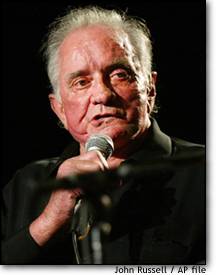
 http://www.yomiuri.co.jp
http://www.yomiuri.co.jp